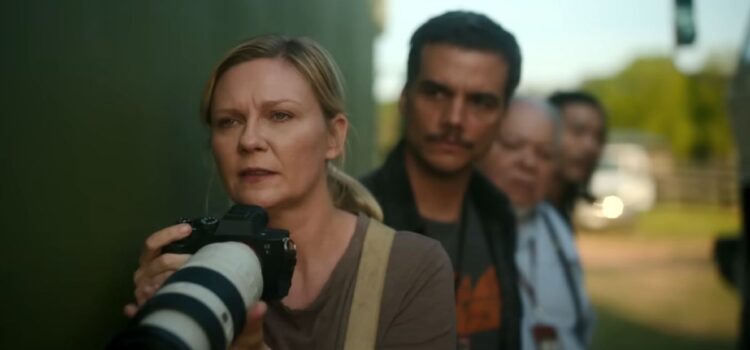By Lynn Venhaus
Unrelentingly grim, the harrowing action film “Civil War” is a provocative look at a nightmarish “What If?” scenario — and claims to be science fiction as it’s set in the future.
Disturbing real-life events in recent years have stirred up thoughts of a domestic doomsday, a cataclysmic reckoning with armed militias if our country’s structures of power, authority and social norms are subverted.
Projecting a second Civil War without getting too deep into politics, British writer-director Alex Garland has escalated America’s current divisions to envision a ravaged war-torn landscape with refugee camps, resistance fighters, military checkpoints, and violent conflict zones. We don’t see how it starts, just that it did, and the nation is engulfed in violent conflicts.
He focuses on the press documenting the atrocities in besieged areas, and their struggles to work and survive in a dystopian dictatorship. Those ethics and their costs personally are a key part of the story.
As a professional journalist for 46 years, I found this very raw and realistic film triggering. It ramped up my anxiety from start to finish, so it’s hard for me to separate fact from fiction here.
However, as a film the technical work is first-rate while Garland’s screenplay, meant to be an allegory, is a tad wobbly.
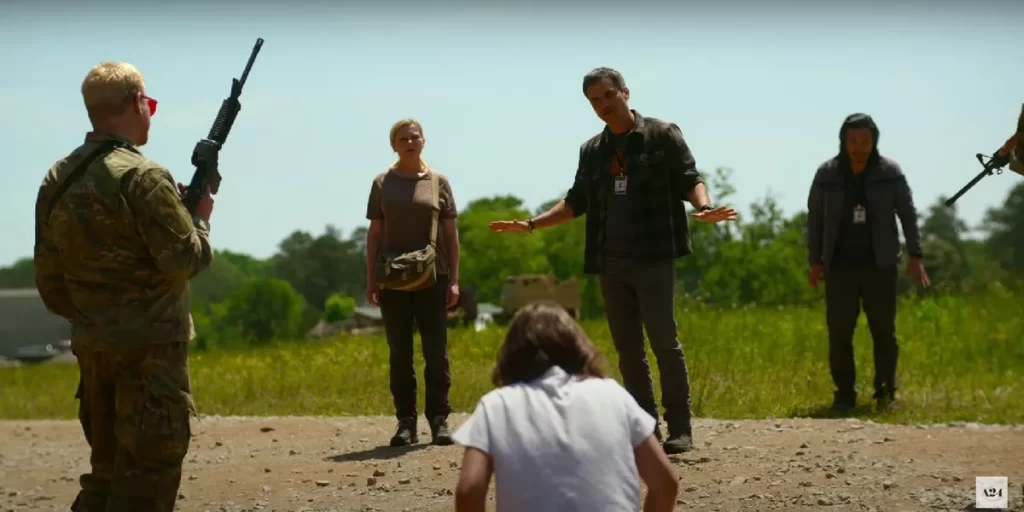
It’s no coincidence that the national release date, April 12, just happens to be the day in 1861 that the first — and so far, only — Civil War started. (Note: The film did have its premiere at SXSW on March 14).
This much is true: Actions have consequences. We can all agree on that.
And whether you’re alarmed by seeing a partisan extremist holding an assault rifle and asking what kind of an American are you while he stands next to a mass grave is going to determine how you feel about this hard-hitting but not entirely convincing film.
The primary character is Kirsten Dunst as Lee Smith from Colorado, a bold, taciturn war photographer patterned after the famous World War II chronicler Lee Miller, who embedded with the military in Europe, and was among the first in Dachau concentration camp after liberation.
Dunst plays Lee as a hardened risk-taker who eventually shows signs of being weary of all the horror she’s witnessed. Wagner Moura is her more gregarious but still jaded colleague Joel, a reporter for Reuters News Service.
Their dispatches are defining images for a homeland where some folks are pretending it’s not happening. Their next assignment is taking them from New York City 800 miles away to D.C. to interview the president.
With no mention of a name or party affiliation, he is serving his third term and is played with gravitas by Nick Offerman. We do know he abolished the FBI, and a bit of dialogue refers to an ‘anti-fa massacre.’
The pair are trying to get to the White House before rebel factions do, and complications arise with the addition of two passengers.
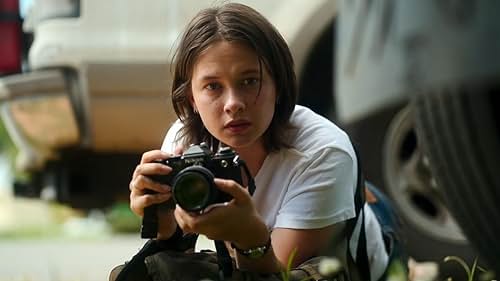
Their professional rival, a grizzled veteran named Sammy from the New York Times, tags along – and he’s played by first-class character actor Stephen McKinley Henderson.
The film’s strength lies in the performances, with Cailee Spaeny a standout as Jessie, a novice photographer whose encounter with her role model Lee leads to her inclusion in the car. Lee is reluctantly forced to take Jessie under her wing, and it’s on the job training in a hurry.
Garland prefers to keep a distance instead of emotionally engaging us, as the desensitized journalists are sketched in broad strokes. Fueled by adrenaline, they fearlessly rush into danger while others flee it – because that is what they do.
Garland uses snapshots of their work to demonstrate the impact of visual images in telling a story. Cinematographer Rob Hardy’s vivid work is exceptional as he contrasts the bucolic countryside with the bloody chaos of bombings. Hardy has collaborated with Garland before, on his acclaimed “Ex Machina” and “Annihilation.”
While journalists are notorious for gallows humor, these cynical correspondents go about their jobs with workmanlike precision. Yet, the trauma they witness has changed them – although we don’t get too many details.
That is a frustrating aspect of this film – the lack of specifics, which is intentional, but confusing because it is so vague. I get Garland’s point that he’s trying to be sly, but whether he’s lensing the aftermath of apathy or anarchy — or both — is unclear.
Several states have alliances, and soldiers from the Western Forces are headed to the capital. Don’t waste time trying to figure out what California, Texas and Florida are up to because you’re not going to find out.
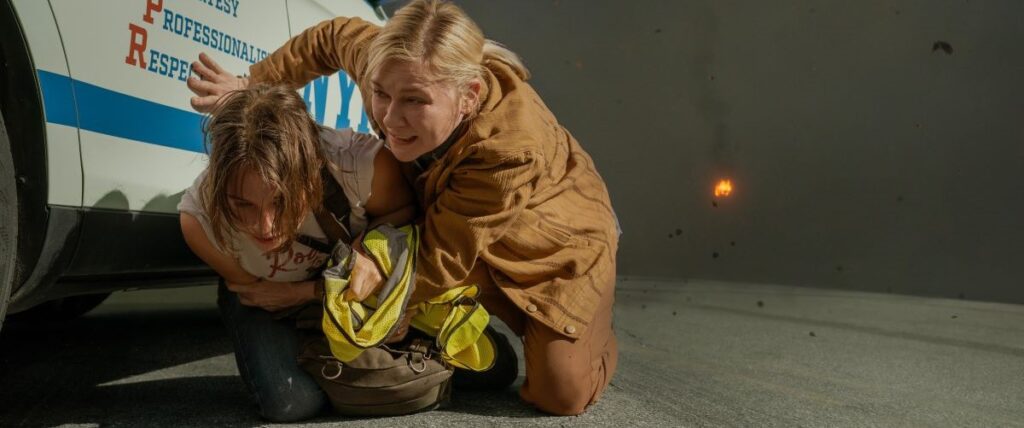
Garland has written some of the best sci-fi films of the new millennium, including “28 Days Later,” “Sunshine” and “Never Let Me Go.”
His films always pack a visceral punch, and for this one, the examples of torture and war crimes are grisly. Just as chilling, though, are glimpses of random weaponized citizens roaming in quaint small towns.
Editor Jake Roberts has done a fine job of plunging us into the darkness and despair of this depiction. The sound work is award-worthy, from the loud bursts of ricocheting bullets to the primal screams you don’t hear.
However, for all its bravura, the film’s needle-drops are puzzling, and are more jarring than appropriate. Ben Salisbury and Geoff Barrow’s odd choices in music don’t seem to fit the action that we’re witnessing.
In the controversy-courting “Civil War,” a Brit gives us an unsettling look at a fractured America without much rhetoric, which could be a clarion call if it wasn’t so detached in its details.
Yet, it’s impossible not to be affected in some way by it. We have been watching similar footage in other countries, and now, this hits close to home. Garland is fueling opinions, that is for sure. Given such an inflammatory subject matter, the post-release debates should be interesting.
(As Harper Lee wrote in “To Kill a Mockingbird”: “People generally see what they look for and hear what they listen for.” — Judge Taylor)
“Civil War” is a 2024 action science fiction film written and directed by Alex Garland and starring Kirsten Dunst, Wagner Moura, Stephen McKinley Henderson, Cailee Spaeny, Sonoya Mizuno, and Nick Offerman. It is rated R for strong violent content, bloody/disturbing images, and language throughout, and runs 1 hour, 49 minutes. It opens in theatres April 12. Lynn’s Grade: somewhere between a B- and a C+.
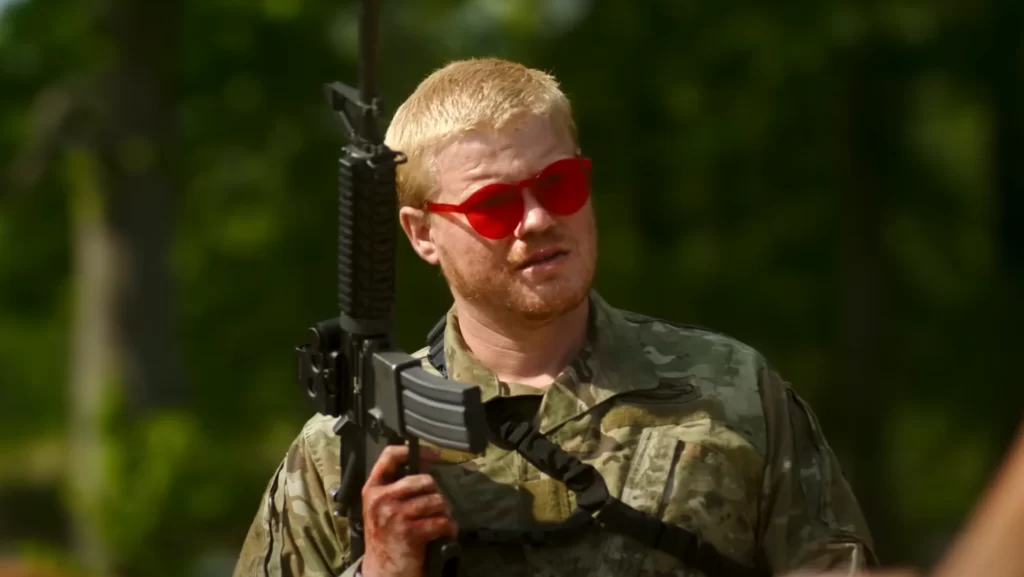

Lynn (Zipfel) Venhaus has had a continuous byline in St. Louis metro region publications since 1978. She writes features and news for Belleville News-Democrat and contributes to St. Louis magazine and other publications.
She is a Rotten Tomatoes-approved film critic, currently reviews films for Webster-Kirkwood Times and KTRS Radio, covers entertainment for PopLifeSTL.com and co-hosts podcast PopLifeSTL.com…Presents.
She is a member of Critics Choice Association, where she serves on the women’s and marketing committees; Alliance of Women Film Journalists; and on the board of the St. Louis Film Critics Association. She is a founding and board member of the St. Louis Theater Circle.
She is retired from teaching journalism/media as an adjunct college instructor.

